"Packing Lunch"
August 27,
2009 - Vol 1, Issue 13
| |
|
E-News Drawing
|
If you
receive our newsletter, you will be entered into a
drawing each month for a great prize for your
kitchen. Check here each month to see if you have
won, if so, come in to collect your prize!
July's
winner:
Heather Boggs
Heather won a shopping tote.
Congrats Heather, come by anytime to pick up your
prize. | |
|
Food to
Go!
|
Whether you're off to
work or school, preparing for lunch time is a daily
dilemma! Time and nutrition seem to be at odds in the
process. After all, you barely got breakfast out of the
way! But the stars are aligned for renewed energies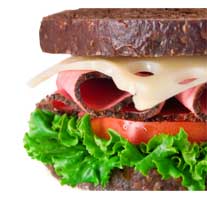 applied to packing your lunch. Yes, it's the back
to school time of year, but packing a great lunch is not
just for kids anymore! Packing your lunch saves
money, shifts nutrition for the better, and, in the end,
saves time. A great lunch is the perfect respite in the
middle of a busy day and offers that necessary refueling
for the afternoon ahead. In this issue, we'll offer a
slew of tips for a better lunch and how to make it easy.
We complete our Knives 101 discussion with Part 2.
A review and three recipes from Tom Colicchio's new
book, 'wichcraft
brings fresh inspiration to sandwich-making and,
therefore,
lunch-making!
applied to packing your lunch. Yes, it's the back
to school time of year, but packing a great lunch is not
just for kids anymore! Packing your lunch saves
money, shifts nutrition for the better, and, in the end,
saves time. A great lunch is the perfect respite in the
middle of a busy day and offers that necessary refueling
for the afternoon ahead. In this issue, we'll offer a
slew of tips for a better lunch and how to make it easy.
We complete our Knives 101 discussion with Part 2.
A review and three recipes from Tom Colicchio's new
book, 'wichcraft
brings fresh inspiration to sandwich-making and,
therefore,
lunch-making!
|
| August Wine of the
Month |

Mommessin
2007
Beaujolais
Grand Reserve
(This
is the wine
that
we served at the
August
Wine Walk
where
it was a
hit!)
|
Elko Downtown Upcoming
Events!
|
Elko
Downtown Business Association Upcoming
Events:
3rd
Annual Elko DBA Wine Walk Date:
Saturday, September 12th
6th
Annual Elko Uncorked Wine Tasting
Event
Friday, October 9th - 5:30pm -
8:30pm
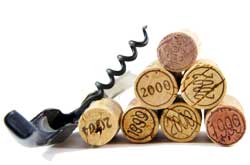 Enjoy
wine, beer, and holiday spirits at participating
Downtown businesses. This year's Uncorked event will be
similar to the summer Wine Walks. Enjoy
wine, beer, and holiday spirits at participating
Downtown businesses. This year's Uncorked event will be
similar to the summer Wine Walks.
$20 per person/$35 per couple, bring your
previously purchased 2009 Wine Walk wine glass for a $2
discount! |
| New Monthly Contest...
"Stumped Us" |
It
seems like a few times a month a customer comes into
Cucina Fresca with a question, product, or quandary that
simply stumps us. The answer is usually found with a
quick google search, but we thought this could turn into
a fun contest. Each month we will feature one of the
things that "Stumped Us." If you email us the correct
answer you will be entered to win a monthly prize.
August's
"Stumped Us" Question:
"What is a Foley
Fork?"
Email us with
your
answer...
July's "Stumped Us"
results . . .
"What are Grains of
Paradise?"
Correct
answer....
Grains of Paradise come
from West Africa, where they grow on a leafy plant and
are easily harvested. The name comes from Medieval spice
traders looking for a way to inflate the price - it was
claimed that these peppery seeds grew only in Eden, and
had to be collected as they floated down the rivers out
of paradise. Although Grains of Paradise are now rare
and expensive, they used to be used as a cheaper
substitute for black pepper. They have a zesty flavor
reminiscent of pepper, with hints of flowers, coriander
and cardamom.
July
entry winner....
Amaya Ormaza-Winer
Most of our July entries
were correct , but our favorite incorrect answer was:
"the salt on the rim of my margarita glass"....by Marva
Santina. We decided she deserved a prize also. We
think you will also agree! Come in anytime to pick up
your prize.
| | |
|
Cucina Fresca's Upcoming
Events!
|
|
|
Build a Better
Lunch!
|
Looking
for motivation to upgrade your lunch habits? We have several
good reasons to offer that will help overcome some of the
common obstacles to packing a good lunch for yourself or for
your family.
 Stockpile
Some Cash - Even a simple lunch out can be $6-10.
A packed lunch from home can cost anywhere from $2-4. If you
save $4/day for 20 workdays per month, that's $80/month, or
$960/year. To paraphrase Will Rogers, this starts "to add up
to some real money!" Stockpile
Some Cash - Even a simple lunch out can be $6-10.
A packed lunch from home can cost anywhere from $2-4. If you
save $4/day for 20 workdays per month, that's $80/month, or
$960/year. To paraphrase Will Rogers, this starts "to add up
to some real money!"
Improve Your Nutrition - Food
is fuel! Lunch should provide no more than one-third of your
daily calories. High fat and/or high carbohydrate lunches can
easily exceed that one-third rule, and actually slow you down
for the afternoon. We're surrounded by high calorie and high
fat options everywhere! A Big Mac® contains 540 calories and
29 grams of fat; add a large fry and you're adding another 500
calories and 25 more grams of fat. Even fast food salads with
fat-laden dressings can tip into the "too much" range. Lunch
is a great chance for making good on that intention to improve
your diet. Planning good food ahead of time and packing a
lunch will provide better fuel for your body!
Save Time - Fast food really
isn't all that fast! By the time you drive or walk to
the restaurant, wait in line, wait for your order and drive
back, at least 10-15 minutes have passed. A great lunch can be
packed at home in less than 10 minutes!
Use Less Packaging - Packing
a lunch in reusable containers avoids fast food packaging and
all of the waste that accompanies one quick meal.
Fight Boredom with Creativity and
Variety - Lunch can be so much more than a peanut
butter sandwich and a side of carrot and celery sticks!
- Incorporate more fruits and veggies in your lunch with
grape tomatoes, cucumber sticks, berries, grapes, broccoli
"trees," or whatever's in season.
- Avoid packing processed foods - they're generally more
expensive, have questionable ingredients, are packaging
intense, and often nutritionally suspect with high sodium
and preservatives.
- Have a quick Plan B for those hurried mornings! A Plan B
might include freezing several sandwiches ahead of time, or
individual portions of previous suppers.
- Apportion tomorrow's lunch before serving tonight's
supper. You'll avert the risk of there being no leftovers
available after the meal.
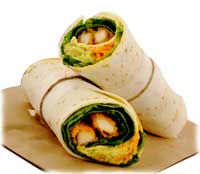 Enjoy
packing a good sliced bread sandwich, but don't forget about
wraps, pita bread, bagels, rice cakes, crackers, English
muffins, or croissants as sandwich foundations. Enjoy
packing a good sliced bread sandwich, but don't forget about
wraps, pita bread, bagels, rice cakes, crackers, English
muffins, or croissants as sandwich foundations.
- Make that apple more enticing - slices (drizzled with a
little lemon juice to prevent browning) might be easier to
handle at lunchtime. Include vanilla yogurt for a quick dip,
or a nut butter for smearing on the fruit.
- What to drink? Skip sugary drinks. Pack a lime or lemon
slice to dress up tap water. Perhaps some herbal tea - hot
or cold. You could even rediscover milk at lunch - we're
told we all need more calcium and Vitamin D.
- Watching your calories? Packing your own lunch is a
great start. Bring an open-faced sandwich and you've sliced
the bread calories in half. Or, use a lettuce leaf for a
sandwich wrapper.
- Explore bean spreads (hummus, refried beans), tapenades,
guacamole, or cream cheese spreads with your own diced
vegetable and fruit "mix-ins."
- A layer of wilted greens sautéed in garlic is an easy
solution for injecting leafy green vegetables into your
sandwich.
- Make lunch kebabs of meat and cheese, veggies and
fruits. You could even make some antipasto on a stick!
- Make your own trail mix - GORP - 'Good Ole' Raisins and
Peanuts' - or any combination of dried fruits, nuts, crunch,
and sparkle (M & M's?).

- Investigate some hearty salads - bean salads, meat
salads, pasta salads, veggies with pesto.
- Change the types of bread used in sandwiches - rye,
pumpernickel, oatmeal, baguette, sesame - there are scores
of bread choices. Similarly, vary your choice of cheeses and
meats.
- Dress up leftover rice or pasta with nuts, herbs and a
simple dressing of olive oil and a flavored vinegar. Add a
few leftover vegetables, and it's a complete meal.
- Review the calorie count and nutritional profile of your
packed lunch - too little, too much, or just
right?
|
Make It
Easy!
|
You're
much more likely to establish a habit of packing lunch if you
have a plan and the right set-up for food on the go! Set
yourself up with appropriate lunch tools!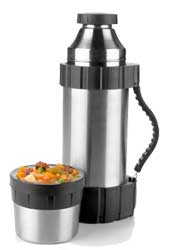
Thermoses - To keep hot foods
hot, and cold foods cold, use a thermos. This isn't just a
matter of having a pleasant food experience, it promotes food
safety by keeping foods out of the temperature range that
promotes bacterial growth. Beverage thermoses are typically
tall and narrow, and often double as drinking mugs. Many
styles with stainless steel, double-walled construction are
available. Previously, thermoses relied on glass inserts which
had the nasty habit of breaking.
Wide-Mouthed Thermoses -
Shaped differently, constructed similarly to other thermoses,
these units are perfect for soups, stews, or your favorite
chili.
The New Brown
Bag - How do you carry your lunch? The brown paper
sacks of our youth are largely gone. Today, it's about
insulation! Small coolers, insulated nylon bags, reusable
canvas bags are all perfect for toting lunch, and keep food
appealing and safe.
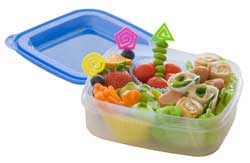 Ice Packs - If you don't have
access to a refrigerator at work or school, keeping food from
getting too warm before lunch time is important. Use small gel
packs designed specifically for use with food, or create your
own with frozen water in zippered plastic bags. Freezing your
sandwich or your lunch's drink provides an additional source
of coolness for your lunch pack. Ice Packs - If you don't have
access to a refrigerator at work or school, keeping food from
getting too warm before lunch time is important. Use small gel
packs designed specifically for use with food, or create your
own with frozen water in zippered plastic bags. Freezing your
sandwich or your lunch's drink provides an additional source
of coolness for your lunch pack.
Food Containers - Lunch can
be one of the most intensive meals for generating waste. In
the fast food world, Styrofoam® clamshells, cardboard
packaging, drink containers and individual packaging of all
types easily generates a mountain of trash. A modest
investment i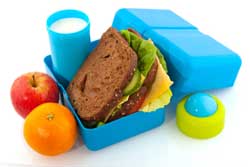 n
great food containers not only saves on trash, but creates a
pleasant meal experience. Throw in a cloth napkin and create
some thrifty elegance! Containers from other cultures are
interesting and practical. Seek out Indian tiffin tins or
Japanese Bento boxes. n
great food containers not only saves on trash, but creates a
pleasant meal experience. Throw in a cloth napkin and create
some thrifty elegance! Containers from other cultures are
interesting and practical. Seek out Indian tiffin tins or
Japanese Bento boxes.
Silverware - Pack the real
stuff! It's environ-friendly and so much nicer to dine with
than flimsy plastic versions that break when spearing a cherry
tomato. If you're cramped for space in your lunch pack, a
"spork" might be your
answer!
|
Knives 101 - Part Two of
Two
|
Last
issue we discussed the basic parts of every knife. In this
issue we uncover the reasons for the many shapes of knives and
how to choose the right knife for the task at hand. If you've
perused our knife display cases, the different shapes of
knives and their blades can be confusing. Each knife has been
designed with specific tasks in mind with the shape of the
blade directly related to the knife's function. For our
discussion we'll categorize knives into four
types:
Slicing
Knives - As the name implies, these knives are
for slicing and cutting a variety of foods. They may have one
of four edges:
- Straight
edges are for normal slicing. The blade should be no
more than 1/8-inch thick and no taller than 1-1/2-inches
high.
- Serrated
edges should be used for softer foods such as, bakery
items and some fruits and vegetables.

- Scalloped
edges (the reverse of a serrated edge) is also used
for softer foods and occasionally semi-frozen meats being
sliced thinly as in the case of stir-fry preparation.
- Hollow
edges, sometimes termed a Granton® edge, are for
slicing thick cuts of meat or other foods where the face of
the cut surface might tend to crumble or stick to the knife
as with cheese and many processed meats.
Chef or Cook's Knives - This
is the basic kitchen knife and is sometimes categorized as a
"chopper." These knives are tapered from point to handle. They
should be at least 2 inches high with 6 to 12 inches of  blade
length. The 8-inch blade size is the most popular length,
though the 10-inch blade is the preference of most
professionals. This knife is used for chopping and slicing
vegetables and fruits, and for mincing and dicing tasks. A
chef's knife is one of the most important knives you can
own. blade
length. The 8-inch blade size is the most popular length,
though the 10-inch blade is the preference of most
professionals. This knife is used for chopping and slicing
vegetables and fruits, and for mincing and dicing tasks. A
chef's knife is one of the most important knives you can
own.
Fine-work
Knives - This group of knives includes paring knives of
all types. These knives are used for peeling, cutting out
gristle from  meats,
or removing bad spots from foods. Choose a blade length that
you are most comfortable with in your hand and for the task.
Boning knives and fillet knives fall into this category and
usually sport a narrow, flexible blade that is quite handy
when deboning meat, fowl, or fish. meats,
or removing bad spots from foods. Choose a blade length that
you are most comfortable with in your hand and for the task.
Boning knives and fillet knives fall into this category and
usually sport a narrow, flexible blade that is quite handy
when deboning meat, fowl, or fish.
Special Use Knives -  This
grouping of knives includes cleavers, Asian chef's knives such
as Santokus, garnishing knives, and other very, task-specific
knives. This
grouping of knives includes cleavers, Asian chef's knives such
as Santokus, garnishing knives, and other very, task-specific
knives.
A basic cutlery set-up should start with a
Chef's knife (8 or
10-inch), a Paring
knife (2 ½ - 3 ½ -inch), a Serrated Slicer or Bread
Knife, and a Slicing
Knife (8 to 10-inch blade). Buy the best knives you can
afford adding to your collection when you can. Take care of
your knives and they will reward you with years and years of
service!
|
Q &
A's
|
 Q: How does a thermos
work? Q: How does a thermos
work?
A: Hot foods or
cold foods all move toward room temperature. A thermos
provides insulation around the food in the form of a vacuum or
foam insulation neither of which transfer heat in or out very
well; the hot or cold temperature of the food is retained. To
maximize the insulating thermos' capabilities, prime the
thermos with very hot water, or ice water; let set for 5
minutes to allow the temperature to 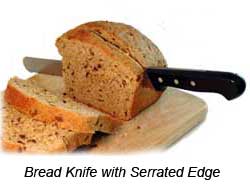 permeate
the inside of the thermos. Then fill with the very hot or very
cold foods. A good thermos properly prepared will keep foods
safe for several hours. permeate
the inside of the thermos. Then fill with the very hot or very
cold foods. A good thermos properly prepared will keep foods
safe for several hours.
Q: How is a bread knife
sharpened?
A: Bread knives, like
other knives, have a serrated edge. This dimpled edge, which
is so useful for grabbing the food when cutting, is beyond the
capabilities of the average sharpener. Each indentation must
be sharpened individually with the proper tool by
professionals trained on serrated edges.  The
good news is that, used properly for the right task, your
bread knife will rarely require sharpening. The
good news is that, used properly for the right task, your
bread knife will rarely require sharpening.
Q: What food safety rules
apply to packed lunches?
A: Keep hot foods hot,
and cold foods cold! It's recommended that food not sit at
room temperature for more than 2 hours. If the temperature is
90°F or more, then only 1 hour. Pack foods in insulated
containers or bags that retain the hot or cold temperatures of
the food. Leave your lunch in the refrigerator overnight or
until you're ready to leave the house. Take care during lunch
preparation not to introduce bacteria to your food with any
cross-contamination. Lunch meat, once the package is opened,
should be eaten within 3-4 days.
Q: What is the recent
controversy over unsafe plastic bottles?
A: Some plastics used
in water and juice bottles degrade when reused over and over
again potentially producing bisphenol A - (BPA). Opt for
plastic water bottles that are BPA-free or units constructed
of stainless steel for your reusable water
bottle.
|
Cookbook
Review
|
'wichcraft
by Tom Colicchio and Sisha Ortúzar. Text by Rhona Silverbush,
Photographs by Bill Bettencourt. Copyright 2009. Published by
Clarkson Potter/Publishers, an imprint of the Crown Publishing
Group, a division of Random House, Inc., New York,
NY.
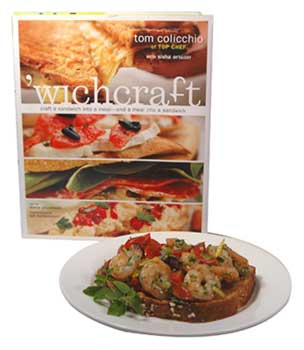 The
clever name and the sumptuous photographs had us falling in
love with this cookbook immediately! Tom Colicchio, of Bravo's
"Top Chef" show and
his business partner, Sisha Ortuz, started a 'wichcraft
restaurant in New York with the idea that a great sandwich
would be appreciated and sought after. They were right, twice
- through the restaurant and through this recently released
book. The cookbook goes a long way in solving the conundrum of
creating interesting sandwiches, yet ones that are accessible
in the home kitchen. The book is organized around
breakfast sandwiches, cool sandwiches, warm sandwiches, and
sweet sandwiches. Between each category, useful tips on
building a great pantry, bread basics, party fare and many
more topics are presented. The be'wiching thing about this
book is the exquisitely devised recipes where the ingredients
perfectly complement each other. With innovation and
creativity applied to the humble sandwich, Colicchio and
Ortúzar have broken new ground on our behalf and to our great
satisfaction. The
clever name and the sumptuous photographs had us falling in
love with this cookbook immediately! Tom Colicchio, of Bravo's
"Top Chef" show and
his business partner, Sisha Ortuz, started a 'wichcraft
restaurant in New York with the idea that a great sandwich
would be appreciated and sought after. They were right, twice
- through the restaurant and through this recently released
book. The cookbook goes a long way in solving the conundrum of
creating interesting sandwiches, yet ones that are accessible
in the home kitchen. The book is organized around
breakfast sandwiches, cool sandwiches, warm sandwiches, and
sweet sandwiches. Between each category, useful tips on
building a great pantry, bread basics, party fare and many
more topics are presented. The be'wiching thing about this
book is the exquisitely devised recipes where the ingredients
perfectly complement each other. With innovation and
creativity applied to the humble sandwich, Colicchio and
Ortúzar have broken new ground on our behalf and to our great
satisfaction.
|
Recipes for Fabulous
Sandwiches
|
Reprinted with permission from
'wichcraft by
Tom Colicchio and Sisha Ortúzar, Text by Rhona Silverbush,
Photographs by Bill Bettencourt. Copyright 2009. Published by
Clarkson Potter/Publishers, an imprint of the Crown Publishing
Group, a division of Random House, Inc., New York, NY.
Copyright 2009. All rights reserved.
Gruyère
with Caramelized Onions
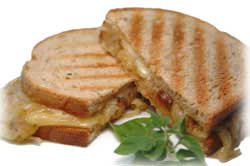
You'll
never think of a "grilled cheese sandwich" in the same way
again! The piquant cheese choice of Gruyère paired with the
sweetness of the slowly cooked onions fashioned a sandwich
where every bite was savored. The extra sandwich we made at
suppertime, reheated nicely for lunch the next day doubling
our enjoyment.
Click here to view the full
recipe.
Click here for a
printable
version of the recipe.
Roasted
Shrimp Salad with Tomatoes and Olives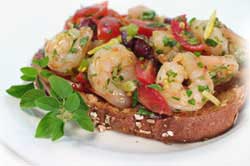
The
authors described this shrimp salad (no mayo here!) as a
shrimp scampi sandwich. We couldn't agree more. The fresh
vegetables and herbs accentuated the garlicky shrimp. Heaped
on toast that had been gently rubbed with garlic, there was
almost a panzanella aspect to this recipe. The open-faced
sandwich assembled easily for a better-than-average
lunch.
Click here to view the full
recipe.
Click here for a
printable
version of the recipe.
Roasted
Pork Loin with Prunes, Dandelion Greens, and
Mustard
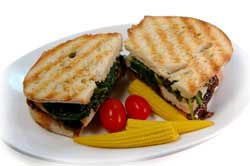 This
sandwich proved to be a hearty supper meal with a perfect
blend of great complex tastes that were easy to recreate. The
seared pork tenderloin was complemented with the mustardy
sweetness of the plums. We substituted spinach for the
dandelion greens and enjoyed the garlic and vinegar flavorings
of the greens with each bite of the sandwich. The extra
fixings made a great lunch the following day. This
sandwich proved to be a hearty supper meal with a perfect
blend of great complex tastes that were easy to recreate. The
seared pork tenderloin was complemented with the mustardy
sweetness of the plums. We substituted spinach for the
dandelion greens and enjoyed the garlic and vinegar flavorings
of the greens with each bite of the sandwich. The extra
fixings made a great lunch the following day.
Click here to
view the full
recipe.
Click here for a
printable
version of the
recipe.
|
New Cucina Fresca Staff
Members
|
|
Join us in welcoming two new staff members to Cucina
Fresca:
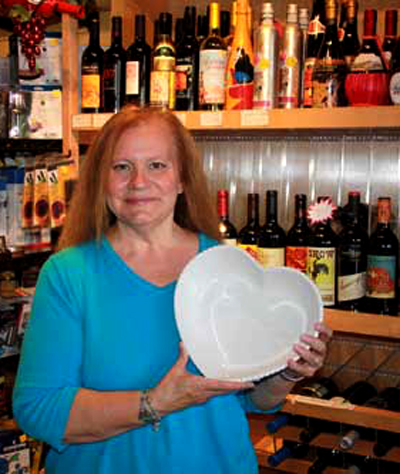 Mary Lou
McClelland Mary Lou
McClelland
Mary Lou has recently retired from a
nursing career, and also has a background in Interior Design.
She will be creating the displays throughout the store.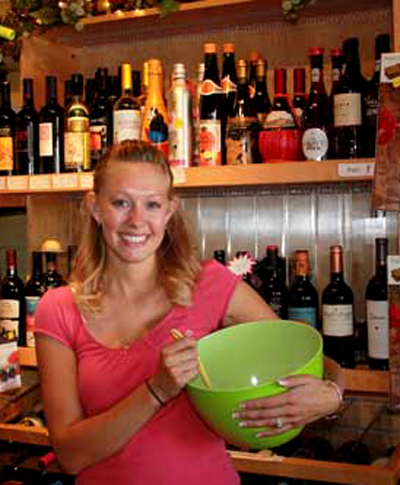
Sarah
Nutting-Smith
A native of the Elko area, Sarah has
just graduated from Utah State University and has returned to
Elko with her husband, Ty Smith.
We are thrilled about these
additions to our staff!
| |
Here's to
better eating through better
lunches!
|
|
| |